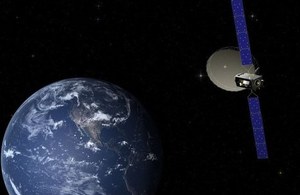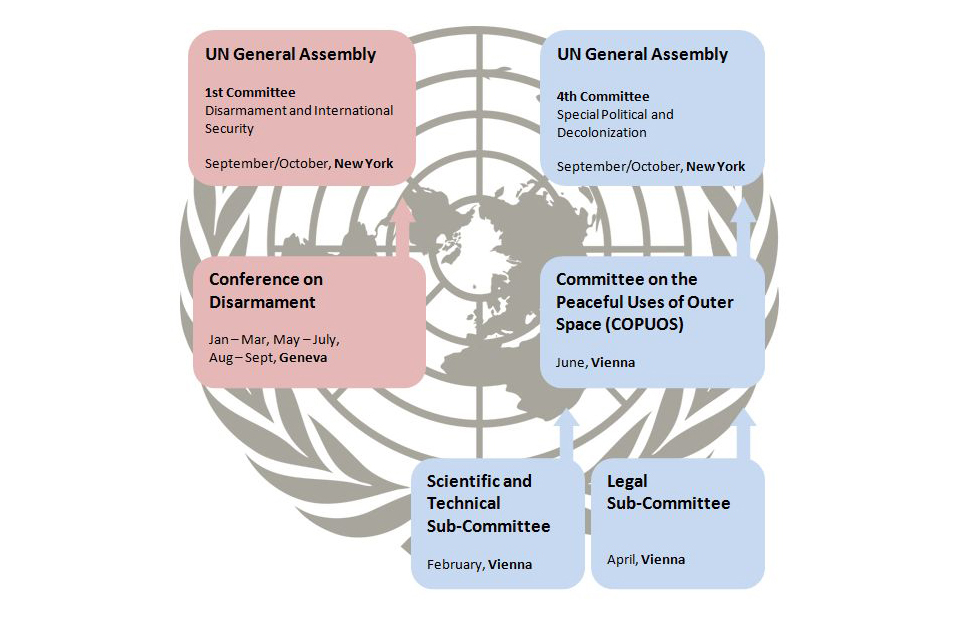UN Space Agency highlights growing pressure on space sustainability
Report from the 2015 session of the UN's Committee on the Peaceful Uses of Outer Space

Artist's impression of AlphaSat. Credit: ESA.
UK Mission to the UN, Vienna, Austria
17 July 2015
This year’s United Nation Committee on the Peaceful Uses of Outer Space (COPUOS) saw a UK delegation made up of representatives from the UK Space Agency and FCO contributing to welcome developments in a number of policy areas that are important to the UK.
The Long-term Sustainability of Outer Space Affairs (LTS)
COPUOS’ work on LTS recognises that while space appears limitless, in reality certain areas in space are considerably more useful than others for space-based technology. The economic and technological barriers to launching space assets are decreasing rapidly, which in turn is increasing the pressure and competition amongst actors for ‘space’ in space.
One example of this competition is that satellites and other space-related assets delivering services we all rely on, such as global-positioning and telecommunications systems, all require particular orbital paths around the earth – paths that are becoming increasingly congested. If we add to the mix the estimated 22,000 dead satellites, spent rocket bodies and all other forms of orbital debris satellites we begin to see the paramount importance of discussing space in the context of ‘sustainable use’.
COPUOS is drafting international guidelines to promote Member State action to address these issues. Representatives from the UK Space Agency have been involved in this process from the start, ensuring that our national interests are promoted. The draft guidelines are scheduled to be finalised and passed to the UN General Assembly for their endorsement by the end of 2016.
International Code of Conduct for Outer Space Activities
At COPUOS, the European External Action Service also hosted a well-received panel discussion on the International Code of Conduct for Outer Space Activities (the Code) ahead of the first negotiation round on ‘the Code’ to be held in New York on 27 – 31 July.
In 2007, the EU began consultations towards the Code to help promote transparency and confidence-building measure. It is designed to enhance the safety, security and sustainability of activities in outer space and to establish international information sharing arrangements on space objects and activities. Although not legally-binding, the Code would be the first instrument to put in place norms of responsible behaviour in space, explicitly covering both civilian and military uses. If agreed, it will help ensure that space remains an asset that every country can safely and securely access and benefit from.
Preparations for joint UN General Assembly 1st and 4th Committee meeting, October 2015
COPUOS also considered transparency and confidence-building measures in outer space activities and how they relate to the safety of space operations and the long-term sustainability of outer space activities. The discussion explored the topics that will be covered during a joint ad hoc meeting of the First and Fourth Committees of the General Assembly in late October 2015 in New York. This joint meeting at the UN General Assembly level will provide an unprecedented occasion of both the civilian and military uses of space to be discussed by UN Member States in the same forum.
COPUOS
The UN Committee on the Peaceful Uses of Outer Space (COPUOS), based in Vienna, meets every June. COPUOS is part of the UN’s Office for Outer Space Affairs (UNOOSA) and works to the UN’s five space treaties that governing Member State activities in outer space. It is mainly a technical forum mandated to foster scientific and legal cooperation in the development of future UN outer space policy.
UNOOSA
The UN Office for Outer Space Affairs (UNOOSA) remains a relatively small UN organisation. It is, however, fast maturing as the base for all international discussions on outer space affairs within the UN system. This evolution is being driven by the need for increased international cooperation in space to meet the challenge of a constant increase in space actors from both the public and private sectors.
Reporting to the UN General Assembly’s 4th Committee, COPUOS has two sub-committees that meet earlier in the year, one for scientific and technical matters and another for legal matters related to outer space. COPUOS compliments the discussions in the Conference on Disarmament (Geneva) that reports to the 1st Committee at the General Assembly and concentrates on the disarmament and potential military uses of outer space.

Outer space policy making in the UN system